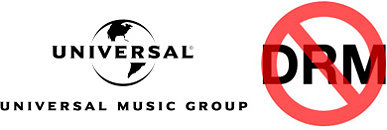News Posts matching #Music
Return to Keyword Browsing

Apple today announced that within six months it will lower the prices it charges for music on its UK iTunes Store to match the already standardized pricing on iTunes across Europe in Austria, Belgium, Denmark, Germany, Finland, France, Greece, Ireland, Italy, Luxembourg, Netherlands, Norway, Portugal, Sweden, Switzerland and Spain. Apple currently must pay some record labels more to distribute their music in the UK than it pays them to distribute the same music elsewhere in Europe. Apple will reconsider its continuing relationship in the UK with any record label that does not lower its wholesale prices in the UK to the pan-European level within six months.
"This is an important step towards a pan-European marketplace for music," said Steve Jobs, Apple's CEO. "We hope every major record label will take a pan-European view of pricing."

EMI started the anti-DRM movement by being the first major record label to sell their music without DRMs. Fortunately, Universal Studios caught on quick, and now offers the majority of their library sans DRMs to select retailers. And thanks to a recent promotion of the Amazon DRM-free music selling service, and a new partnership of said music service with Pepsi, more record labels are planning to sell DRM-free music. Warner Music Group, who owns material from famous artists such as Black Sabbath, is planning to put their music on Amazon. Sony BMG is also planning to place their material on Amazon. The main reason behind this sudden adoption of DRM-free material is the recent success behind DRM-free music. A symbol of this success is Universal making 85% of their music available as an unprotected MP3 file. Universal is all but confirmed as staying in the DRM-free MP3 market, pending final results of the market trial due in mid-January.
Well, according to some analysts, the CD simply isn't cool anymore among 12-24 year olds, the demographic most record labels target. And so, they're trying to make it 'cool' by replacing the 'square' CD with a much sleeker USB stick. The USB stick would include songs, videos, and some multimedia content from the artist. Keane and The Pussycat Dolls will be the pioneers in USB stick single albums, with their latest stuff coming out before Halloween on the USB stick. While USB sticks may be smaller and sleeker than CDs, they don't appear to be much cheaper. The average USB single album would cost about £5 (€7/$10) per stick, about £2 more than the CD single album. The fact that most car radios do not have a USB slot may also restrict adoption of the new media format.

EBay is known for selling all sorts of interesting goodies. Among them are tickets to the Led Zeppelin reunion show. When Led Zeppelin promotor Harvey Goldstein heard about this, he tried to get eBay to stop selling these tickets. According to Goldstein, eBay "basically told us to **** off". And so, in response to this, Goldstein vowed to seriously mess with the lives of the people selling these tickets on eBay. Goldstein plans on messing up the lives of these people by declaring the tickets purchased off eBay null and void, which will cause a nightmare for a lot of hardcore Led Zeppelin fans. Checking whether or not a ticket was purchased off eBay is surprisingly easy, all they have to do at the box office is deny entry to anyone who bought the ticket with a different credit card than they have. The Led Zeppelin Reunion show will take place on November 26 at London's 02 Arena.

Jammie Thomas, a single mother from Minnesota, has been ordered to pay $222,000 in damages after being found guilty of illegally sharing music over the internet. Thomas was found to have shared over 1,700 files via Kazaa under the username Tereastarr, of which 24 were named in court. As a result she was ordered to pay $9,250 for each of the 24 songs, which totalled to $222,000. Thomas' defence attorney argued that there was no proof she was behind the keyboard sharing the songs, and forensic scientists were unable to find any evidence on her hard drive because it has been recently replaced. However, based on the fact that Thomas used the nickname Tereastarr for a number of internet services and that the sharing had been traced to her modem's MAC address the jury found her guilty of the charges. At the end of the case RIAA attorney Richard Gabriels said "This is what can happen if you don't settle."

Last week, Demonoid was down for quite some time, and everyone seemed to think it was due to the Canadian Recording Industry Association. Demonoid is back with a vengeance, and proudly proclaims they were not shut down, rather, they merely had a bit of server trouble. However, to avoid future issues with the CRIA (and possibly the American RIAA), they are prohibiting anyone from North America to access their tracker. ISOHunt.com and it's partners have followed suit, presumably for the same reasons.

We've been hearing rumors about the cost of a game that includes three accessories: a guitar, a drum set, and a microphone. MTV finally has an answer for us: you can get the entire kit for the price of $169.99USD. Rock Band will arrive for the Xbox 360, PS2, and PS3 on November 23rd. Wireless controllers will become available later on.
Not all hacking is bad, or that's at least what the hacker "Deviant Ollam" wants us to think. His "Traveling Terabyte" project takes an ordinary hard drive, adds a large volume of music, videos, and other content to it, sends it overseas with USB cables and international power adapters in a standard Pelican case, and asks soldiers to add their own content before sending it to another soldier. Soldiers who have received the kits thus-far have loved the idea, especially considering that digital content is little and far between in the middle of the desert. There is no word as to whether or not the digital content is legal.

During a recent concert, Nine Inch Nails lead singer Trent Reznor decided to let his fans know exactly what he thought of CD prices.
STEAL IT. Steal away. Steal and steal and steal some more and give it to all your friends and keep on stealin'. Because one way or another these mother****ers will get it through their head that they're ripping people off and that's not right.
Universal Media is not very pleased with Trent Reznor's comments. You can see the full version of the rant
here.

It doesn't matter how much DRM-free music EMI Group PLC. and Universal Music Group make, if nobody sells it, there's no point. Thankfully, Wal-Mart realized this, and quickly remedied that problem. For $0.92 per song, or $9.22 per album (slightly less than iTunes, Napster, and other competitors), you can get yourself DRM-free songs from the previously mentioned record labels. Songs will be distributed as Windows Media Audio (WMA) files, and there is no mention as to what the bit-rate will be.
Currently, iTunes and Amazon are the only vendors selling DRM-Free music, but they will soon be joined by Wal-Mart, iTunes, and hopefully several others.

LimeWire is well known throughout the pirating world as one of the most common file sharing engine. Recenly, LimeWire has faced lawsuits from the RIAA, Universal Music, Sony BMG, EMI and Warner Music. It seems as though LimeWire is making some attempt to go straight. The
LimeWire Music Store will sell DRM-free 256Kbps MP3s from IRIS distribution and Nettwerk Productions. The LimeWire Store will have popular artists available, such as Avril Lavigne, Sarah McLachlan, and Paul Van Dyk. The LimeWire file sharing client will still be available, however, future versions will have links in them to the LimeWire Music Store.
There is no word on when the store will launch, how much money each song will cost, and whether or not other record labels will join LimeWire.

Denis Kvasov has just manged to get off with no charges for his wildly known site ALLOFMP3.com. The site has been shut down by Russia, because of the conditions set by the World Trade Organization. For that reason Denis Kvasov had to face Russia's court, and face all sorts of fines and jail time for breaking copyright laws. In the end it seems that he lucked out with weak, and poorly written copyright laws in the country. The charges simply could not be held against him, and he has been let go without any kind of punishment held against him.
EMI tested the idea of DRM (Digital Rights Management software) free music by offering their DRM-free music to Apple's iTunes Plus store and Microsoft's Zune store a few months ago. Finally, other music groups are following suit. Industry giant Universal Music Group is planning to offer an unknown amount of their vast library to Real's Rhapsody, Wal-Mart, Amazon, and even Google. However, they are not offering any DRM-free music to Apple's iTunes Plus store at this point. We will start seeing these restriction-free tracks in January 2008, if all goes well. In January, Universal will closely monitor sales, increases in piracy, and other factors before "going all in".
As we know, CD sales are dropping like flies in a house full of bugzappers, and services like iTunes can sometimes crash under the load of music downloaders. However, a new reason to stick with analog CD's has come to light: analog CD's are insured while digital copies of songs rarely are. If a fire or burglar were to snatch a computer full of music, chances are the actual owner of the PC would not be able to make a claim for that music.
The chances of a digital music collection getting lost/stolen/destroyed is about 24% in the UK, which would make backing up a music collection sound advice. Unfortunately, making a backup of any DRM-infested music is hardly worth the trouble, as you will not be able to listen to the backup copy anyways. And even if a backup did succeed, chances are that the backup would be destroyed/stolen with the original.
Fortunately for the future, the number of insurers covering digital property is increasing. While some insurers, such as Churchill Insurance, will cover up to £1,000 worth of music claimed "in good faith" (aka without a receipt), companies such as Zurich refuse to insure digital property at this time.

The famous MP3 online store (or rather infamous for not paying the artists) has been shut down by the Russian government. Pressure from the US, RIAA, and refusal to enter the World Trade Organization lead to the site's demise.
Before the shutdown, AllOfMP3.com was a direct competitor to iTunes due to its pay-by-size versus Apple's pay-by-track system. Tracks that were downloaded there were also devoid of all DRM and the user could even choose which bitrate to download.
Popular online retailer Amazon has confirmed that it
plans to launch a DRM-free music store, which should allow customers to chose from a wide variety of songs from numerous artists. Apple recently took a step forwards after a deal with EMI allowed it to sell unprotected music via its iTunes store, and Amazon today announced that it plans to offer "millions of soungs" from over 12,000 record labels, all DRM-free. Amazon will be the first major distributor to offer all downloads without any digital rights management, which should allow customers to transfer music between different devices much easier compared to downloads from competing firms - something which has often been criticised by music fans. Amazon has not revealed when this service will go live, nor is there any indication of which regions it will be available in and what prices will be like, but this should be a good move from the consumer's view provided songs aren't too expensive.

SINGAPORE - May 3, 2007 - Creative (NASDAQ: CREAF), a worldwide leader in digital entertainment products, today introduced the Creative ZEN Stone, the tiny, featherweight 1GB MP3 player priced at only S$69.00, available by May 4.
The Creative ZEN Stone features a smooth contoured design, so it feels naturally comfortable in your hand. It is so light that at first, you might not believe it is an MP3 player. The Creative ZEN Stone allows you to rock in color; pick your favorites from black, white, red, blue, pink and green, to fit any mood or fashion.

Online retailer Amazon.com could be about to launch a DRM free music store next month providing that it can reach an agreement with the music industry. According to The Times, Amazon has been approaching major music companies in the last fortnight with ambitions to provide unprotected music downloads in order to compete with Apple's iTunes store. Although Amazon has previously been unsuccessful in such requests for the last 18 months, Apple's recent deal with EMI to provide music without any digital rights management protection has reignited Amazon's hopes. EMI and the smaller independent labels are expected to be the first to allow Amazon to sell their music (if they are successful), whilst record labels such as Sony BMG, Universal and Warner generally seem reluctant to allow their music to be distributed online without DRM.

As most of you already know, EMI has
liberated it's music from the DRM (Digital Rights Management) monster, and Apple is the first company to support it. Apple will be distributing DRM-free music through iTunes right as soon as they settle their problems
with the EU. However, some people don't like being forced into low-quality encoding (128 KB/s AAC) just so they can listen to DRM free music. Microsoft may be the answer to this problem. They are trying to get DRM-free EMI music into their Zune Marketplace, and negotiations are looking hopeful. There is no word as to what encoding this DRM free music will be in.
If you judge by the title of this story alone, you might think that the European Commission (EU) is punishing Apple and EMI for getting ready to offer music sans DRM's (Digital Right Management). The EU's complaint is much simpler than that. Apparently, Apple would only be applying these costs in some parts of the iTunes store. So, a song can cost less in one European country than another. This violates a very important article of the EU, and so Apple may incur a 10% fine if they do not change things soon.
For those of you curious about the shenanigans going on between EMI and Apple: The two companies have proudly announced a strategic partnership, and EMI will be sending Apple all their music without DRMs, which is a bold move. It is risky from a business standpoint, but very welcomed from a customer standpoint. Proof that EMI will be pioneering DRM free music can be found
here in their press release.

Stylish and Versatile Home Studio Monitoring Headphones For Pure Music Enjoyment
SINGAPORE - 4 April, 2007 -- Creative Technology Ltd. (NASDAQ: CREAF), a worldwide leader in digital entertainment products, today announced the Creative
Aurvana DJ Headphones. Sophistically designed with brushed metal and diamond-cut finishing, these powerful headphones offer precise audio reproduction for discerning music listeners, DJ mixes and home studio monitoring use. Built for ultra-comfort using high-grade acoustic components, the Creative Aurvana DJ Headphones are ideal companion products for any MP3 or portable media players with a regular headphone jack. It also perfectly complements Creative's latest range of X-Fi Xtreme Fidelity audio systems, offering a truly remarkable listening experience.

Digital Rights Management is famous for frustrating numerous people that chose to download music legally when it comes to sharing between devices, whilst the illegal file sharers sit there laughing at them. But now it seems one of the major record labels, EMI, could be listening to customers at last. Rumours are flying around the internet claiming that Steve Jobs' visit to London to speak with EMI could be to negotiate a deal that will see significant amounts of EMI's music catalogue being available to download on iTunes without anti-piracy software, something music fans have been begging for since the start of the legal music downloads. If this is true, then it might not take long for the other major record labels to respond with DRM-free music, a move which would make it much easier for music downloaders to play their music on different MP3 players. There will be a live audio webcast of the press conference at 1pm London time on
EMI's website, which is when the deal is supposed to be announced.
Update: it's official, EMI has launched DRM-free downloads across its
entire music catalogue (although iTunes will get it first) - read on for the press release.
While piracy may be to blame for the drop in sales of some forms of digital media, it certainly isn't to be blamed for all drops in sales. Music CD sales (not prices, unfortunately) have declined sharply over the past three months. In Q1 2006, 112 million music CD's were sold. This year, various record labels have "only" managed to sell around 89 million CD's.
However, most clouds do have a silver lining. Record companies are very happy to announce that they have sold a total of 288 million music tracks on the internet (legally), up from 242 million from last year. Legal music album downloads have decreased to 99 million sales from 119 million sales last year. This may be indicating that consumers are telling record companies that they really don't want to buy albums that only have a few tracks that they really want.

RIAA launches website for music copyright violators to pay without going to court
People who are caught by the RIAA usually have to pay a substantial amount of money to record companies. And so, the RIAA has decided to make a little website dedicated to helping the average pirate through the process of getting caught.
P2Plawsuits.com is dedicated to doing three things. The first thing they do is post a list of questions convicted pirates might ask, and proper answers to them. The second thing the RIAA posts on their website is options/details on how to reduce the convict's fine, and even settle out of court. The third thing that the RIAA does is link to a website detailing the advantages of downloading legal music, which also hosts a list of legitimate music downloading services.
With Microsoft receiving a hefty $1.5 billion fine the other day, MP3 patents are once again in the spotlight as a company in Texas is now trying to sue… well every company that makes MP3 players really. At the moment, Apple, SanDisk and Samsung are the three major names involved, but this case has the potential to draw more companies in - although it may seem quite ambitious as things stand. The company behind the lawsuits is known as Texas MP3 Technologies Ltd. which holds a patent which it claims covers the production an "MPEG portable sound reproducing system." The patent was issued in June, and now the company hopes to make money out of the MP3 player industry, which was worth approximately $6.1 billion last year.
Return to Keyword Browsing









